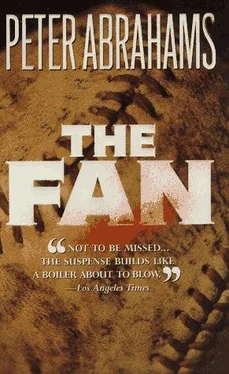Peter Abrahams - The Fan
Здесь есть возможность читать онлайн «Peter Abrahams - The Fan» весь текст электронной книги совершенно бесплатно (целиком полную версию без сокращений). В некоторых случаях можно слушать аудио, скачать через торрент в формате fb2 и присутствует краткое содержание. Жанр: Триллер, на английском языке. Описание произведения, (предисловие) а так же отзывы посетителей доступны на портале библиотеки ЛибКат.
- Название:The Fan
- Автор:
- Жанр:
- Год:неизвестен
- ISBN:нет данных
- Рейтинг книги:4 / 5. Голосов: 1
-
Избранное:Добавить в избранное
- Отзывы:
-
Ваша оценка:
- 80
- 1
- 2
- 3
- 4
- 5
The Fan: краткое содержание, описание и аннотация
Предлагаем к чтению аннотацию, описание, краткое содержание или предисловие (зависит от того, что написал сам автор книги «The Fan»). Если вы не нашли необходимую информацию о книге — напишите в комментариях, мы постараемся отыскать её.
The Fan — читать онлайн бесплатно полную книгу (весь текст) целиком
Ниже представлен текст книги, разбитый по страницам. Система сохранения места последней прочитанной страницы, позволяет с удобством читать онлайн бесплатно книгу «The Fan», без необходимости каждый раз заново искать на чём Вы остановились. Поставьте закладку, и сможете в любой момент перейти на страницу, на которой закончили чтение.
Интервал:
Закладка:
He made his way to home plate, rubbed it with the toe of his city shoe: a tasseled loafer, actually. Tasseled loafers had been on a list recommended by Cincinnati. The crushed-stone base paths seemed luminous to Gil, a hollow diamond in the darkness. He walked to first, or where first would be had the bags been in place, slowly; rounded it, stumbling just a little, and continued on to second and third, even slower now, barely dragging one foot in front of the other by the time he reached home. There was no internal soundtrack of cheering and yelling, or any of that shit: he’d seen all those stupid movies. All he heard was his own breath, sibilant between his lips, rasping in his throat.
“No appealing,” he said aloud, and stamped on the plate, dead center: safe. Then, picking up his pace, he crossed to the home-team dugout, a simple cement-block bunker with a flat roof, and sat on the concrete bench. He stared out at the pitching mound, a pale, negligible hump.
Later, feeling the cold, he pulled his suit jacket around him and curled up on the bench, facing the dugout wall, hands between his knees. He closed his eyes, or they closed themselves; he fell asleep, or he passed out.
Richard Renard left St. Jeanne d’Arc Hospital the morning of the deciding game of the Series. Didn’t sign himself out or consult anyone: simply waited until after rounds and rose from his bed on the ward. He put on some clothes from his locker, then sat on the bed and rested for a while. After that, not wanting to risk being spotted on the elevator, he took the stairs to ground level, resting on every landing, and a few times in between.
He found his car in the parking lot out back, unlocked it, got in, rested. Then he drove a hundred and fifty miles to the ballpark. Game time was 1:00 P.M. The dashboard clock read 12:57 when he arrived. He rested for three minutes, then tried to leave the car. That involved twisting his torso, raising the door handle, climbing out. The twisting and raising went fine, but not the climbing. He had never before realized the role legs played in getting out of a car. He’d never had to: all his life, he’d had powerful legs. Now they couldn’t even lift him off the car seat.
Richard Renard sat in his car outside the ballpark. He rolled down the window, he had the strength for that, and listened to the sounds of the game: cheering, shouting, crack of bat on ball, thump of ball in mitt; a thump slightly deeper in tone indicating when his son was on the mound, or so he imagined. He thought of honking the horn for help, but at first couldn’t bring himself to do it. By the time he’d convinced himself otherwise, the physical capability was gone. The ball game and its thumping, cracking sounds began to distance themselves from him, slipping farther and farther away.
Gil was thirsty. His arm ached. Those were distractions he had to ignore. Two more distractions were the crowd, on its feet and roaring, and the runners on second and third, dancing off the bags. Tunnel vision, his father said: a pitcher needs tunnel vision. Gil peered down the tunnel at Bouchard, the Yankee cleanup hitter poised at the plate, big as a man. Bottom of the ninth, two out, two on, and up one to nothing, on Gil’s home run in the top of the inning.
First pitch a ball way outside, almost getting by Boucicaut. Boucicaut came out for a talk.
“Maybe we should walk him,” Gil said.
“Fuck that,” said Boucicaut. “If you want to put him on, at least hit him in the head.”
Boucicaut spat right through his mask and returned to his position. He called for the curve. Gil, wincing even before the pain, threw it in the dirt. The runner on third came halfway down the line. Boucicaut bluffed him back.
Boucicaut crouched, gave the sign. Fastball. Bouchard watched it go by. It looked good to Gil. “Ball three,” said the umpire.
Three and oh. Bouchard would be taking all the way, right? Boucicaut signaled another fastball. Gil wound up and threw, a medium-speed fastball, right down the pipe; and realized as he let go that Bouchard wasn’t taking.
Bouchard uncoiled and got it all, a low screamer right at Claymore between second and third. The ball hit him in the chest, making him cry out and knocking him down, then fell motionless on the base path beside him. Claymore, on his back and in tears, picked it up and brushed the leg of the base runner from second as he raced by. The second-base ump stabbed his fist in the air. Game over: the last out of the championship season.
They jumped up and down. They hugged each other and shouted their heads off. They all got trophies and a handshake from a man in a seersucker suit, and Gil got a special one for being MVP: a brass-plated baseball mounted on a hardwood stand. No one left the field for half an hour or so. That’s when they found Gil’s father’s body, cold and gray, slumped in the front seat of his old Chevy on Spring Street.
Gil, wearing his stand-up red-and-black tie and the shirt and suit so recently unwrapped from dry-cleaner’s plastic, awoke on the dugout bench, shivering. It was still night, but the moon had risen; frost silvered the grass all the way to the outfield fence. Stiff with cold, Gil rose and puked in the corner of the dugout. Nothing but liquid, foul and bitter: what his stomach had done to all the beer and shots. He hadn’t eaten since… he tried to remember when and couldn’t.
Gil climbed the fence, not so easily this time, and got back in his car. He drove back to Main, heater on full blast, and turned up Hill, following it to the northern edge of town where the cemetery separated the last dwelling from the woods. Like many reps with snowy territories, Gil carried a folding shovel in his trunk. He took it now and entered the cemetery.
The town might have been smaller, but the cemetery, like the woods, had grown. The gravestone of Renard, R. G., which had been in the farthest row, with nothing but empty field between it and the trees, now had other stones all around it. Familiar town names: Pease, Laporte, Spofford, Cleary, Bouchard. Gil read them in the moonlight. It took him some time to locate Renard, R. G.
The lawyer who’d executed the will had sold the Chevy to pay for the stone: marble-faced and round-topped, a little nicer than some of those around it, but not very big. There was room for no more than the carved name and the dates of birth and death, bracketing an interval that might have represented the average life expectancy in some sub-Saharan country. Gil pushed it over easily.
He unfolded the shovel, snapped the handle in place, started digging. Quickly down through a wet layer, slow through a still-frozen layer beneath that, a little faster through the dry earth below. Gil began to sweat, although his hands and feet were cold. He dug himself down, knee deep, waist deep, down into his father’s grave, his moonlit breaths rising urgently in the night. After a while, the eastern sky turned milky, as though a celestial eyelid were opening, but Gil, up to shoulder level in darkness, didn’t notice. He bore down with the shovel, tossed out earth, bore down, tossed out, bore down, tossed out, in rhythm, just like hammering at the anvil. It was almost enjoyable, certainly better than any work he’d had since those days at the forge. Should have been a grave digger, he thought, but was considering the possibility that grave digging too was controlled by men like Garrity and O’Meara, when the shovel struck something hard. He looked down, realizing only then that it was daybreak and he had to hurry, and saw a cleared section of pine board, the varnish dulled and grimy. Gil cleared a bigger section, then raised the shovel high and plunged the blade down with all his strength, splitting the wood at his feet. He paused, his nostrils anticipating the arrival of some putrescent smell, but none came.
Читать дальшеИнтервал:
Закладка:
Похожие книги на «The Fan»
Представляем Вашему вниманию похожие книги на «The Fan» списком для выбора. Мы отобрали схожую по названию и смыслу литературу в надежде предоставить читателям больше вариантов отыскать новые, интересные, ещё непрочитанные произведения.
Обсуждение, отзывы о книге «The Fan» и просто собственные мнения читателей. Оставьте ваши комментарии, напишите, что Вы думаете о произведении, его смысле или главных героях. Укажите что конкретно понравилось, а что нет, и почему Вы так считаете.












